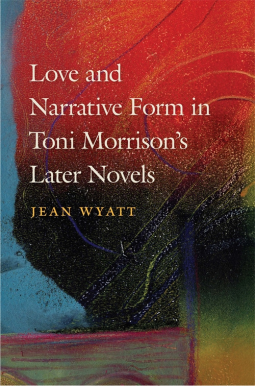
Love and Narrative Form in Toni Morrison’s Later Novels
by Jean Wyatt
This title was previously available on NetGalley and is now archived.
Send NetGalley books directly to your Kindle or Kindle app
1
To read on a Kindle or Kindle app, please add kindle@netgalley.com as an approved email address to receive files in your Amazon account. Click here for step-by-step instructions.
2
Also find your Kindle email address within your Amazon account, and enter it here.
Pub Date Mar 01 2017 | Archive Date May 08 2017
Description
In Love and Narrative Form in Toni Morrison’s Later Novels, Jean Wyatt explores the interaction among ideas of love, narrative innovation, and reader response in Toni Morrison’s seven later novels. Love comes in a new and surprising shape in each of the later novels; for example, Love presents it as the deep friendship between little girls; in Home it acts as a disruptive force producing deep changes in subjectivity; and in Jazz it becomes something one innovates and recreates each moment—like jazz itself. Each novel’s unconventional idea of love requires a new experimental narrative form.
Wyatt analyzes the stylistic and structural innovations of each novel, showing how disturbances in narrative chronology, surprise endings, and gaps mirror the dislocated temporality and distorted emotional responses of the novels’ troubled characters and demand that the reader situate the present-day problems of the characters in relation to a traumatic African American past. The narrative surprises and gaps require the reader to become an active participant in making meaning. And the texts’ complex narrative strategies draw out the reader’s convictions about love, about gender, about race—and then prompt the reader to reexamine them, so that reading becomes an active ethical dialogue between text and reader. Wyatt uses psychoanalytic concepts to analyze Morrison’s narrative structures and how they work on readers. Love and Narrative Form devotes a chapter to each of Morrison’s later novels: Beloved, Jazz, Paradise, Love, A Mercy, Home, and God Help the Child.
A Note From the Publisher
Advance Praise
"Jean Wyatt’s Love and Narrative Form in Toni Morrison's Later Novels
is an absolutely brilliant study of Morrison’s artistry in her later
novels. Not only does it convincingly establish the primacy of love as a
thematic concern in Morrison’s work, but it traces, through the aid of
lucid explanations of theory, the evolving conceptions of love that
Morrison represents through her exploration of literary, narrative form.
Marrying her reading of form to psychoanalytic theory and
investigations of the work done by Morrison’s texts in structuring the
reader’s responses to the ethics of the novels, Wyatt produces an
impressive study that is sure to become a definitive statement on
Morrison’s work."
—Sheldon George, author of Trauma and Race: A Lacanian Study of African American Racial Identity
Available Editions
| EDITION | Other Format |
| ISBN | 9780820350868 |
| PRICE | $29.95 (USD) |
| PAGES | 246 |
Links
Average rating from 2 members
Featured Reviews
 Educator 233589
Educator 233589
This would be a graduate level Morrison course read, as opposed to undergraduate. It might be good to be able to excerpt pieces of it for undergraduates, or to have it as a library copy for them for research, but otherwise I wouldn't make them buy the entire book.



